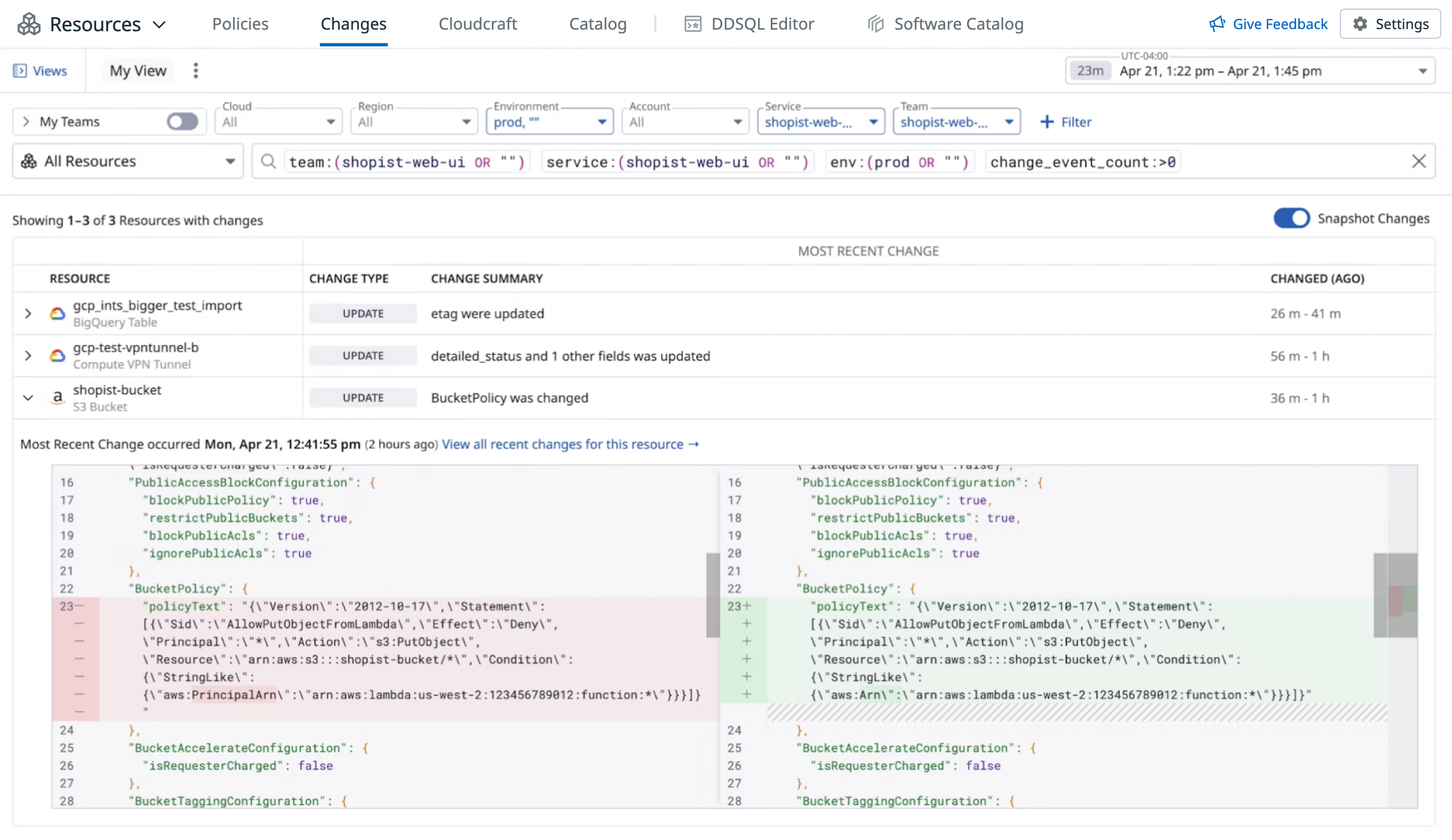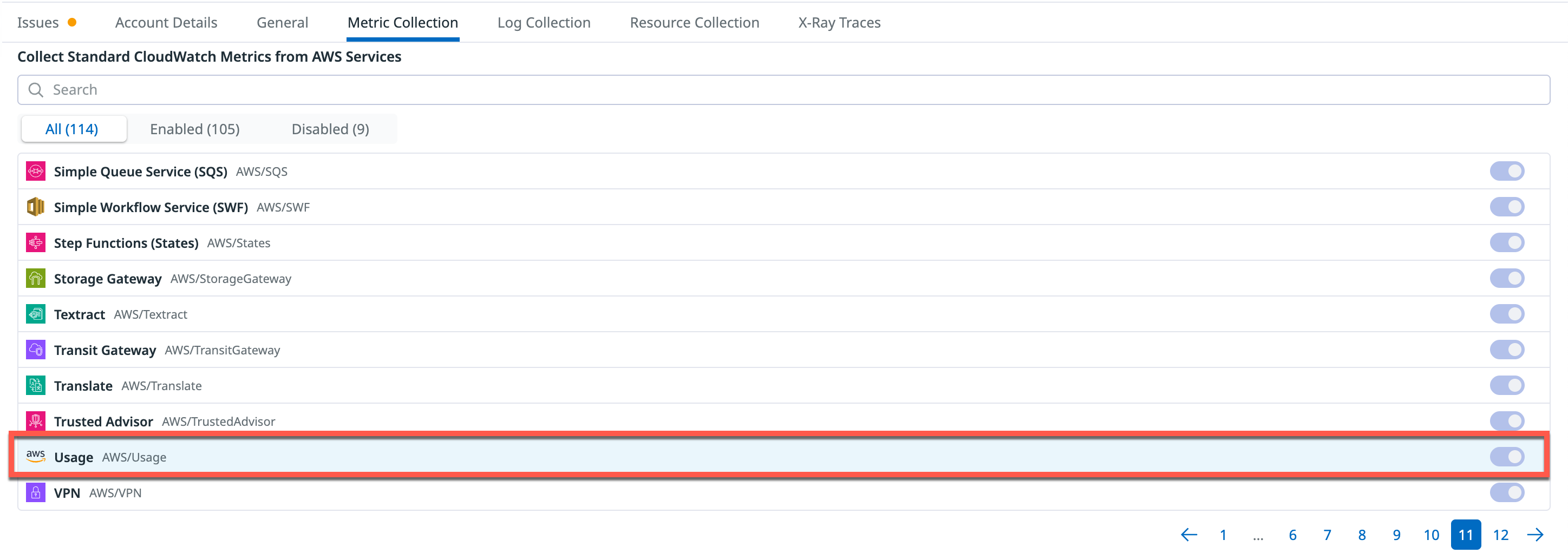- Essentials
- Getting Started
- Agent
- API
- APM Tracing
- Containers
- Dashboards
- Database Monitoring
- Datadog
- Datadog Site
- DevSecOps
- Incident Management
- Integrations
- Internal Developer Portal
- Logs
- Monitors
- Notebooks
- OpenTelemetry
- Profiler
- Search
- Session Replay
- Security
- Serverless for AWS Lambda
- Software Delivery
- Synthetic Monitoring and Testing
- Tags
- Workflow Automation
- Learning Center
- Support
- Glossary
- Standard Attributes
- Guides
- Agent
- Integrations
- Developers
- Authorization
- DogStatsD
- Custom Checks
- Integrations
- Build an Integration with Datadog
- Create an Agent-based Integration
- Create an API-based Integration
- Create a Log Pipeline
- Integration Assets Reference
- Build a Marketplace Offering
- Create an Integration Dashboard
- Create a Monitor Template
- Create a Cloud SIEM Detection Rule
- Install Agent Integration Developer Tool
- Service Checks
- IDE Plugins
- Community
- Guides
- OpenTelemetry
- Administrator's Guide
- API
- Partners
- Datadog Mobile App
- DDSQL Reference
- CoScreen
- CoTerm
- Remote Configuration
- Cloudcraft (Standalone)
- In The App
- Dashboards
- Notebooks
- DDSQL Editor
- Reference Tables
- Sheets
- Monitors and Alerting
- Service Level Objectives
- Metrics
- Watchdog
- Bits AI
- Internal Developer Portal
- Error Tracking
- Change Tracking
- Event Management
- Incident Response
- Actions & Remediations
- Infrastructure
- Cloudcraft
- Resource Catalog
- Universal Service Monitoring
- End User Device Monitoring
- Hosts
- Containers
- Processes
- Serverless
- Network Monitoring
- Storage Management
- Cloud Cost
- Application Performance
- APM
- Continuous Profiler
- Database Monitoring
- Agent Integration Overhead
- Setup Architectures
- Setting Up Postgres
- Setting Up MySQL
- Setting Up SQL Server
- Setting Up Oracle
- Setting Up Amazon DocumentDB
- Setting Up MongoDB
- Connecting DBM and Traces
- Data Collected
- Exploring Database Hosts
- Exploring Query Metrics
- Exploring Query Samples
- Exploring Database Schemas
- Exploring Recommendations
- Troubleshooting
- Guides
- Data Streams Monitoring
- Data Observability
- Digital Experience
- Real User Monitoring
- Synthetic Testing and Monitoring
- Continuous Testing
- Product Analytics
- Session Replay
- Software Delivery
- CI Visibility
- CD Visibility
- Deployment Gates
- Test Optimization
- Code Coverage
- PR Gates
- DORA Metrics
- Feature Flags
- Security
- Security Overview
- Cloud SIEM
- Code Security
- Cloud Security
- App and API Protection
- Workload Protection
- Sensitive Data Scanner
- AI Observability
- Log Management
- Administration
Resource Changes
Resource Changes is not supported for your selected Datadog site ().
Join the Preview!
Resource Changes is in Preview. Click Request Access and complete the form to request access.
Request AccessOverview
Resource Changes provides visibility and control over configuration changes to your cloud infrastructure. It helps you monitor modifications to resources, aiding in troubleshooting incidents and understanding the evolution of your environment.
Resource Changes supports a variety of resources, including:
- Hosts
- Containers
- Serverless Functions
- Databases
- Queues
- Storage
- Networking
- Monitoring
- Identity
- Data Processing
For a comprehensive list of supported resources, see the Supported resources section.
Setup
To view configuration changes for your resources, ensure that resource collection is enabled for your cloud resources so they are visible within the Resource Catalog. You can manage this setting from the Resource Catalog settings page or the relevant cloud provider integration tile. This step automatically enables Snapshot Changes for your resources.
Enabling resource collection can impact your AWS CloudWatch costs. To avoid these charges, disable Usage metrics in the Metric Collection tab of the Datadog AWS Integration.
Snapshot Changes
Snapshot Changes represent configuration and relationship updates that Datadog detects by comparing snapshots of your cloud resources, taken approximately every 5-15 minutes.
To view Snapshot Changes, toggle Snapshot Changes on Infrastructure > Resources > Resource Changes.
Key characteristics of Snapshot Changes:
- No Additional Setup: Requires no extra configuration beyond enabling resource collection.
- Reflects Net Changes: Since changes come from snapshots (5-15 minutes apart), they show the net difference, omitting intermediate states.
- Retention: Datadog Snapshot Changes are retained for one week.
- Cost: Generating Snapshot Changes does not incur additional event charges.
Navigating and viewing Resource Changes
You can access Resource Changes in the Datadog platform in the following ways:
- Main Navigation: Go to Infrastructure > Resources > Resource Changes.
- Within a Resource’s Side Panel:
- Open the side panel for a specific resource (for example, by clicking on a host in the Resource Catalog or a related host view).
- Scroll down to the Recent Changes section.
Querying Resource Changes
The Resource Changes view allows you to search and filter changes using various attributes.
| Query Parameter | Description | Example |
|---|---|---|
| Change Type | Filter by the type of change (Update, Create, Delete). | latest_change_type:Update |
| Resource Category | Query across cloud providers for a general category of resource. | resource_category:hosts (shows EC2, Azure VMs, GCP Compute instances, etc.) |
| Resource Type | Query for specific resource types. | resource_type:aws_ec2_instance |
| First-Class Attributes | Filter by attributes like Cloud Provider, Region, Environment, Account, etc. | cloud_provider:aws region:us-east-1 env:staging account_id:123456789012 |
| Resource Name | Search for resources by their display name. | display_name:*bucket* |
| Tags | Filter resources based on assigned tags. | tags:"application:frontend" "owner:team-alpha" |
Supported search query types
- Wildcard: Use asterisks
*for partial matching (before and after the term). Example:service:*example* - Union (OR): Use
ORfor multiple values (not available for resource types or categories). Example:service:(service_a OR service_b) - Exclusion (Empty/Not Empty): Use
-prefix to exclude. Example:-service:*(shows resources where the service tag is not set).
Troubleshooting with Resource Changes
During an incident, the most critical question is often “What changed?”. Resource Changes helps you answer this.
When a monitor alerts, you are linked directly to the Resource Changes page. This page is pre-filtered with important context from the alert, such as the relevant time frame and any associated tags (like service, env, or team).
Use this centralized page to:
- Identify risky changes: Scan the list of modifications that occurred during the incident window for the impacted service, environment, and related shared infrastructure.
- Investigate the details: Select any suspicious change to view a side-by-side configuration diff and related logs (such as AWS CloudTrail) that help identify who made the change and why.
Supported resources
Resource Changes supports a wide array of resources across AWS, Azure, and Google Cloud Platform.
AWS
AWS
AWS resource types:
aws_acm_certificateaws_ami_imageaws_autoscaling_groupaws_autoscaling_launch_configurationaws_autoscaling_policyaws_autoscaling_scheduled_actionaws_cloudformation_generatedtemplateaws_cloudformation_resourcescanaws_cloudformation_stackaws_cloudformation_stacksetaws_cloudformation_typeaws_cloudfront_anycast_ip_listaws_cloudfront_cache_policyaws_cloudfront_continuous_deployment_policyaws_cloudfront_distributionaws_cloudfront_field_level_encryption_configaws_cloudfront_field_level_encryption_profileaws_cloudfront_functionaws_cloudfront_key_groupaws_cloudfront_managed_cache_policyaws_cloudfront_managed_origin_request_policyaws_cloudfront_managed_response_headers_policyaws_cloudfront_origin_access_controlaws_cloudfront_origin_request_policyaws_cloudfront_public_keyaws_cloudfront_realtime_log_configaws_cloudfront_response_headers_policyaws_cloudfront_streaming_distributionaws_cloudfront_vpc_originaws_cloudtrail_trailaws_docdb_clusteraws_dynamodb_tableaws_ebs_snapshotaws_ebs_volumeaws_ec2_instanceaws_ec2_vpcendpoint_serviceaws_eks_clusteraws_elasticache_clusteraws_elastic_ipaws_elasticsearch_domainaws_elb_load_balanceraws_elbv2_load_balanceraws_eniaws_iam_account_settingsaws_iam_policyaws_iam_roleaws_iam_server_certificateaws_iam_useraws_kms_keyaws_lambda_codesigningconfigaws_lambda_event_source_mappingaws_lambda_functionaws_lambda_layeraws_lambda_policy_statementaws_mq_brokeraws_network_aclaws_rds_blue_green_deploymentaws_rds_clusteraws_rds_cluster_endpointaws_rds_cluster_parameter_groupaws_rds_cluster_snapshotaws_rds_db_cluster_automated_backupaws_rds_db_shard_groupaws_rds_db_snapshotaws_rds_event_subscriptionaws_rds_export_taskaws_rds_globalclusteraws_rds_instanceaws_rds_instance_automated_backupaws_rds_instance_parameter_groupaws_rds_integrationaws_rds_option_groupaws_rds_option_group_to_security_groupaws_rds_proxyaws_rds_proxy_endpointaws_rds_proxy_target_groupaws_rds_reserved_instanceaws_rds_security_groupaws_rds_security_group_ip_rangeaws_rds_snapshot_tenant_databaseaws_rds_subnet_groupaws_rds_tenant_databaseaws_redshift_clusteraws_s3_account_public_access_blockaws_s3_bucketaws_security_groupaws_sns_topicaws_sqs_queueaws_vpcaws_vpc_endpointaws_vpc_nat_gateway
Azure
Azure
Azure resource types:
azure_activity_log_alertazure_aks_clusterazure_app_serviceazure_app_service_planazure_automation_accountazure_container_appsazure_container_registryazure_diagnostic_settingazure_function_appazure_key_vaultazure_key_vault_keyazure_key_vault_secretazure_load_balancer_probeazure_log_analytics_storage_insightazure_log_analytics_workspaceazure_managed_diskazure_mysql_serverazure_network_application_gatewayazure_network_interfaceazure_network_public_ip_addressazure_network_subnetazure_network_vnetazure_network_vnet_peeringazure_network_watcherazure_policy_assignmentazure_postgresql_firewall_ruleazure_postgresql_serverazure_role_assignmentazure_role_definitionazure_security_center_auto_provisioningazure_security_contactazure_security_groupazure_sql_firewall_ruleazure_sql_serverazure_sql_server_databaseazure_storage_accountazure_storage_blob_containerazure_subscriptionazure_virtual_machine_instance
Google Cloud Platform
Google Cloud Platform
Google Cloud Platform resource types:
gcp_bigquery_datasetgcp_bigquery_tablegcp_cloudfunctions_functiongcp_compute_diskgcp_compute_external_vpn_gatewaygcp_compute_firewallgcp_compute_instancegcp_compute_networkgcp_compute_project_metadatagcp_compute_routegcp_compute_routergcp_compute_ssl_policygcp_compute_subnetworkgcp_compute_target_http_proxygcp_compute_target_https_proxygcp_compute_target_ssl_proxygcp_compute_target_vpn_gatewaygcp_compute_vpn_gatewaygcp_compute_vpn_tunnelgcp_dataproc_clustergcp_dns_managed_zonegcp_dns_policygcp_foldergcp_gke_worker_nodegcp_iam_policygcp_iam_rolegcp_iam_service_accountgcp_iam_service_account_keygcp_kms_crypto_keygcp_kubernetes_engine_clustergcp_kubernetes_engine_node_poolgcp_logging_log_bucketgcp_logging_log_metricgcp_logging_log_sinkgcp_monitoring_alert_policygcp_organizationgcp_projectgcp_run_revisiongcp_sql_database_instancegcp_storage_bucket
If you have a request for an additional resource type, contact Datadog Support.
Further reading
Additional helpful documentation, links, and articles:


